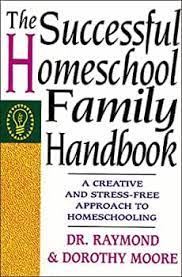
When I first ventured into the world of homeschooling, I was filled with a mix of excitement and nervousness. This was a time before the widespread availability of internet resources and seeking out answers required dedicated effort. I devoured books about homeschooling and learned about many different types of educational approaches. I will cover my most researched approaches, but first I will share a book by a married couple who are known as the “grandparents of homeschooling”. One of the books that emerged as a beacon of guidance and inspiration: "The Successful Homeschool Handbook" by Dorothy and Raymond Moore. Their philosophy, encapsulated within its pages, instilled in me the confidence to embark on this homeschooling journey.
1. Embracing Individualized Learning: As a homeschooling parent, I quickly realized that my child's education needed to cater to their unique strengths, learning styles, and interests. The Moore philosophy echoed this sentiment, emphasizing the importance of individualized learning. Their book provided valuable insights on tailoring teaching methods, adapting curriculum, and fostering a love for learning specific to my child's needs. By embracing this approach, I witnessed firsthand the transformative power of personalized education, allowing my child to flourish academically and emotionally.
2. Discovering Flexibility: In those early days of homeschooling, I yearned for the flexibility to adapt our schedule to suit my child's learning rhythm. The Moore philosophy acknowledged the significance of flexible schedules, enabling children to learn at their own pace. The Successful Homeschool Handbook provided practical strategies for organizing our days, accommodating breaks, and fostering independent learning. This flexibility empowered us to dive deeper into topics of interest, take spontaneous field trips, and create an enriching learning environment that nurtured a genuine thirst for knowledge.
3. Emphasizing Real-Life Experiences: The Moore philosophy emphasized the importance of incorporating real-life experiences into education. Their book encouraged hands-on learning, field trips, and practical activities that connected academic concepts to the world outside our home. This approach resonated deeply with me, as it enabled my child to see the relevance of their studies in a tangible way. By embracing the Moore philosophy, we engaged in exciting experiments, explored nature, visited museums, and connected with the community, fostering a holistic educational experience that extended beyond textbooks.
4. Fostering Strong Family Bonds: Perhaps one of the most profound aspects of the Moore philosophy was its recognition of the pivotal role that strong family relationships play in a child's education. As a homeschooling parent, this resonated deeply with me. The Successful Homeschool Handbook provided insights into creating a nurturing and supportive environment within the family unit. It highlighted the benefits of open communication, trust-building, and fostering a love for learning together. Through homeschooling, my child and I developed a profound bond, and our family became a tight-knit unit that supported and encouraged one another's educational journeys.
The Moore philosophy, encapsulated in their influential book, "The Successful Homeschool Handbook," was a guiding light for me during those early years of homeschooling. Their emphasis on individualized learning, flexibility, real-life experiences, and strong family bonds shaped the foundation of our homeschooling journey. It instilled in me the confidence to chart our own educational path, tailored to my child's needs and aspirations. As an eclectic homeschooler, this book was one of many that I used for inspiration.
 RSS Feed
RSS Feed